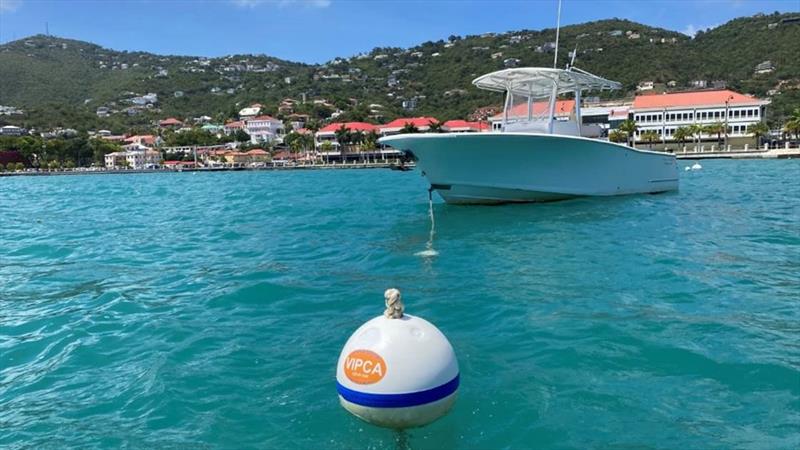
New public moorings now available for use in U.S. Virgin Islands waters
by VIPCA 26 Sep 2023 10:51 PDT
November 11-14, 2023

Vessel on one of the new moorings in Charlotte Amalie harbor, St. Thomas © Phil Blake
The first phase has been completed in the installation of what will be a total of 200 new secure Helix-type moorings in bays throughout the U.S. Virgin Islands.
All 200 Moorings are anticipated to be ready for use by local and visiting boaters, both private/recreational and commercial, in the coming Season, with completed moorings locations live now at boater.boatyball.com/map. The installation is part of a private-public partnership between the non-profit Virgin Islands Professional Charter Association (VIPCA) and the Government of the U.S. Virgin Islands, designed to build the infrastructure necessary to support the marine industry, provide employment by maintaining the moorings, and protect the territory's undersea environment.
Governor Albert Bryan issued the following statement: "The Department of Planning and Natural Resources (DPNR), the Office of the Governor, and VIPCA joined forces for the installation of 200 territorial, day, and overnight recreational moorings utilizing a federal Economic Development Authority (USEDA) grant for $562,000 and with DPNR providing the in-kind match and regulatory guidance. This successful public/private partnership will now allow for monohulls and multihulls to visit many of our popular bays while preventing damage to our precious coral reefs by allowing for vessel mooring for both residents and visitors."
To also support the territory-wide marine moorings project, the Community Foundation of the Virgin Islands (CFVI) has provided grants totaling $175,000. This includes a $100,000 grant from the Fund for the Virgin Islands and a $75,000 grant for St. John moorings from the Friends and Family Fund for USVI Renewal.
Who can use the moorings, how to use and where?
Any yacht, boat, tender or dinghy between 1ft and 65ft, whether local private/recreational or commercial, or visiting private/recreational or commercial, for up to 14 days. The blue-banded moorings are for overnight use with a payment of $35 per night paid online at BoatyBall. The yellow-banded moorings are for day-use with a donation of $10 per use paid online at BoatyBall or, for frequent users, with an annual payment calculated by multiplying their daily use by twelve months in a check made out to "Moorings" provided to VIPCA. Fees collected fund each mooring's third-party liability insurance and year-round maintenance. VIPCA is offering privileges, including free mooring use as compensation, to anyone who nominates themselves as a 'bay host' to assist in frequent and routine reporting of the moorings in any bay in which they reside or visit daily. DPNR's Division of Enforcement will support VIPCA in reporting on mooring use where fees are not paid promptly. For more information email .
"BoatyBall is proud to partner with VIPCA to ensure boaters have an easy way to pay for and stay on maintained and insured moorings in the USVI. Through this partnership, together, we hope to provide a safe environmentally friendly alternative to anchoring," says Bob Wall, co-founder, and CEO of BoatyBall, LLC.
Locations of these moorings can be found at boater.boatyball.com/map or vipca.org/boatyball
"VIPCA works beyond the charter yacht community for the marine economy, workforce development, and marine environment. One of the most significant benefits of vessels using moorings rather than anchoring is that anchoring can break corals that may take a century to grow back, plus the action of the anchor chain sweeping back and forth as the yacht moves in the wind creates a V-shaped area of destruction of soft corals like sea fans as well as seagrass, a mainstay of endangered sea turtles. These new helix-shaped moorings only disrupt a 2-to-3-inch area on the seafloor. Additionally, the line attached to the yacht is supported by a floating buoy, removing the lengthy and damaging anchor chain, thus preventing the damaging action seen in anchoring," says Oriel Blake, VIPCA Executive Director.
For more information about VIPCA and its programs, visit VIPCA.org